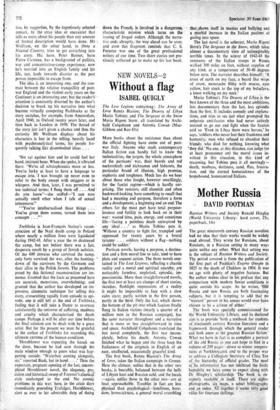NEW NOVELS-2
Without a flag
ISABEL QUIGLY
The Lost Legions containing: The Army of Love Renzo Biasion; The Deserts of Libya Mario Tobino; and The Sergeant in the Snow Mario Rigoni Stern; all translated by Archi- bald Colquhoun and Antonia Cowan (Mac- Gibbon and Kee 63s) More books about the resistance than about the official fighting have come out of post- war Italy. Anyone who reads contemporary Italian fiction can hardly fail to know the technicalities, the jargon, the whole atmosphere of the partisans' war, their beards and red neckerchiefs and nicknames and hideouts, the particular brand of illusion, high promise, euphoria and toughness. Much less do we hear about those who fought, however unwillingly, for the fascist regime—which is hardly sur- prising. The resisters, still clannish and often backward-looking, have something to recall that had a meaning and purpose, therefore a form and a development, a beginning and an end. The others for the most part have total purpose- lessness and futility to look back on in their war: wasted time, pain, energy, and sometimes life—lacing a pointless death uninspired by any ideal . . .' as Mario Tobino puts it. 'Without a country to fight for, trampled and oppressed for twenty years by a brutal tyranny . . . soldiers without a flag—nothing could be sadder.'
Partisan novels, having a purpose, a destina- tion and a firm moral line to take, tend to have plots and sequent action. The three novels con- tained in The Lost Legions, reflecting a chaotic reality and a moral and spiritual anarchy, are noticeably formless, unplotted, episodic, im- pressionistic. More than straightforward novels, the first two at least are clumps of short stories, sketches, flashlight impressions of a reality it might be impossible to face with a slow calm stare; partly written in the first person, partly in the third. Only the last, which shows the bottom of the pit into which fascism finally flung its Italian victims (nearly a quarter of a million men in the Russian campaign), has the same narrator throughout and a narrative that is more or less straightforward in time and space. Archibald Colquhoun translated the last novel completely, the first two incom- pletely, before his death; Antonia Cowan finished what he began and the three keep the Italianness of the originals in English of an easy, unaffected, occasionally graceful kind.
The first book, Renzo Biasion's The Army of Love, takes the Italian campaign in Greece. Here the climate, unlike that in the other two books, is bearable, balanced between the hells of Libyan heat and Russian cold, and the locals —again, unlike those in the other two—are at least_ approachable. Troubles in fact are less physical than psychological—loneliness, bore- dom, homesickness, a general moral crumbling that .shows itself in manias and bullying and a Morbid increase in the Italian pastime of gazing into space.
The last novel is the soberest, Mario Rigoni Stern's The Sergeant in the Snow, which takes almost a documentary view .of unfinaginably terrible times. In the winter of 1942-43 the remnants of the Italian troops in Russia walked 300 miles on foot, without supplies of any kind, at a temperature of 30-40, degrees below zero. The narrator describes himself: "A crust of earth on my face, a beard like wisps of straw, moustache filthy with mucus, eyes yellow, hair stuck to the top of my balaclava, a louse walking on my neck.'
Mario Tobino's The Deserts of Libya is the best known of the three and the most ambitipus, less documentary than the last, less episodic than the first. It includes comedy and explana- tions, and tries to see just what prompted the unheroic anti-fascist who had never actively resisted to go out and fight when the fascists said so. 'Even in Libya there were heroes,' he says, `soldiers who never lost their frankness and humanity; men who refused to abandon their friends; who died for nothing, knowing what 'they did.' No one, at this distance, can judge (or at least pronounce on) the moral issues in- volved in this situation, in this kind of reasoning, but Tobino puts it all movingly— death, madness, dottiness, sand, flies, frustra- tion, and the eternal, homesickness of the hoptebound, homecentred










































 Previous page
Previous page